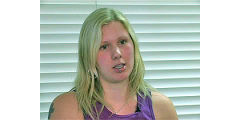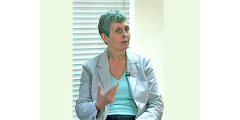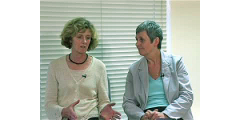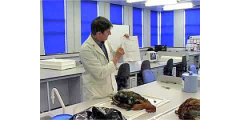Planning module content: mind-mapping, podcasting and WebCT (now Moodle)
June 26, 2007
Video >> Richard Field, Geography: “I actually planned it out, and I wanted to deliver it via what we call mind maps. Our first years have a series of lectures called study skills, or series of sessions called study skills given by a colleague of mine, and we talk quite a lot about teaching with …
Learning from lectures: a dyslexic student’s view
June 18, 2007
Video >> Kate: “Are there any teaching and learning strategies that some of your tutors may adopt that are particularly supportive of your study?” Annie Evans, student, Archaeology: “The thing I’ve found really useful is we have one lecturer who just puts everything on WebCT (now Moodle), like seminar reading lists…absolutely everything, journals…and then its …
What is the first step for students being screened for dyslexia?
Video >> Barbara Taylor, Academic Support: “I think one thing that is happening is more and more students are coming and directly asking the question ‘Am I dyslexic?’, whereas in the past we’ve had students come and say ‘I’m struggling with this’ or ‘my essay’s not getting quite the good marks’ and you work with …
Using a discussion board to support Maths students
Video >> Kate: “I understand that you’ve been using WebCT (now Moodle) a little bit last year and the feature you’re particularly wanting to use was the discussion boards. How’s that worked for you?” Joel Feinstein, Mathematical Sciences: “That’s right, yes. I wanted the students to be able to ask questions of each other, of …
Dyslexic students and exams: giving effective feedback on performance
Video >> Kate: “What are the common problems that you hear about in relation to the formal written examinations as faced by a dyslexic student?” Barbara Taylor: “A number of my students sit with me and actually go through past papers as part of their preparation for exams. They are really anxious about answering the …
How do academic staff get to know a student is identified as dyslexic?
Video >> Kate: “What ways do you end up corresponding and communicating with their academic staff?” Christine Carter, Academic Support: “I think there would be, in the first stage, there’s sort of a systems approach almost, really, or that’s what it tends to end up feeling like although it isn’t actually that. “When the report from …
Support for developing writing skills
Video >> Kate: “Students are going to need to develop very high levels of writing and argument and different ways of presenting their ideas and the concepts that they’re learning about, how do you focus in and help them learn and develop those writing skills at such a high level?” Andrew Fisher, Philosophy: “First off …
Advising students on reading: prioritising reading lists
Video >> Kate: “What kind of help and support do you give for students in helping them focus and direct their readings, in your area?” Andrew Fisher, Philosophy: “Well, I think all lecturers do this; in the module guide I give quite a detailed reading list and that is split up by lecture, so in …
Podcasting Maths lectures: how and why?
Video >> Kate: “So I understand that you’ve been experimenting with the use of audio podcasting; tell me how that’s gone.” Joel Feinstein, Mathematical Sciences: “That’s right, yes. The University was kind enough to lend me a professional quality mp3 recorder which I’ve been using to make audio podcasts, audio recordings of all of my …
Learning through labs and practical work
February 21, 2007
Video >> Kate: “In a subject such as yours, what do you think are the main purposes of running practical classes for your students?” Martin: “The main purpose in this case is to reinforce the material that we’ve dealt with in the lecture. The lectures are good for describing concepts and explaining principles, but in …










